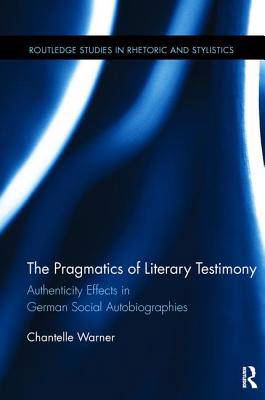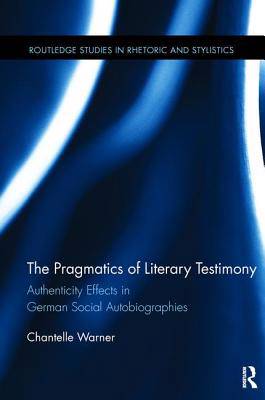
- Retrait gratuit dans votre magasin Club
- 7.000.000 titres dans notre catalogue
- Payer en toute sécurité
- Toujours un magasin près de chez vous
- Retrait gratuit dans votre magasin Club
- 7.000.0000 titres dans notre catalogue
- Payer en toute sécurité
- Toujours un magasin près de chez vous
The Pragmatics of Literary Testimony
Authenticity Effects in German Social Autobiographies
Chantelle WarnerDescription
In this book, Warner examines a number of German-language literary autobiographies that are connected to diverse social movements of the last forty years. These books have all received critical attention from the popular press, topped bestseller lists, and have been pivotal in discussions of authenticity, subjectivity, and referentiality. Because of the thematic diversity of these works, scholars within literary and cultural studies have tended to treat them separately under topical categories, such as women's literature, the post-war generation, migration and multiculturalism, etc. Underlying Warner's analysis is the belief that the social construction of autobiographical acts is as much a matter of textuality as it is of topicality i.e., how language means, rather than what it means, and that a pragmatic-stylistic approach is well-suited to describing how literary autobiographies come to function as testimonies to certain collective experiences.
By presenting a model for an integrative stylistics approach, The Prgamatics of Literary Testimony participates in current discussions within fields of literary linguistic scholarship, as well as autobiographical theory. In its analysis of key examples of German social testimonies from the late twentieth century, this book incorporates insights from discourse analysis, pragmatics, cogntive poetics, and sociolinguistics in order to demonstrate that this diverse body of works constitutes a particular form of textual practice defined by what the author calls authenticity effects--feelings of realism, immediacy, exemplarity, genuineness, and social relevance. Such a study of authenticity as a poetic effect, can help us to better understand the testimonial glamour owned by various types of autobiographical narration.
Spécifications
Parties prenantes
- Auteur(s) :
- Editeur:
Contenu
- Nombre de pages :
- 226
- Langue:
- Anglais
- Collection :
Caractéristiques
- EAN:
- 9781138115927
- Date de parution :
- 31-05-17
- Format:
- Livre broché
- Format numérique:
- Trade paperback (VS)
- Dimensions :
- 152 mm x 229 mm
- Poids :
- 308 g

Les avis
Nous publions uniquement les avis qui respectent les conditions requises. Consultez nos conditions pour les avis.






